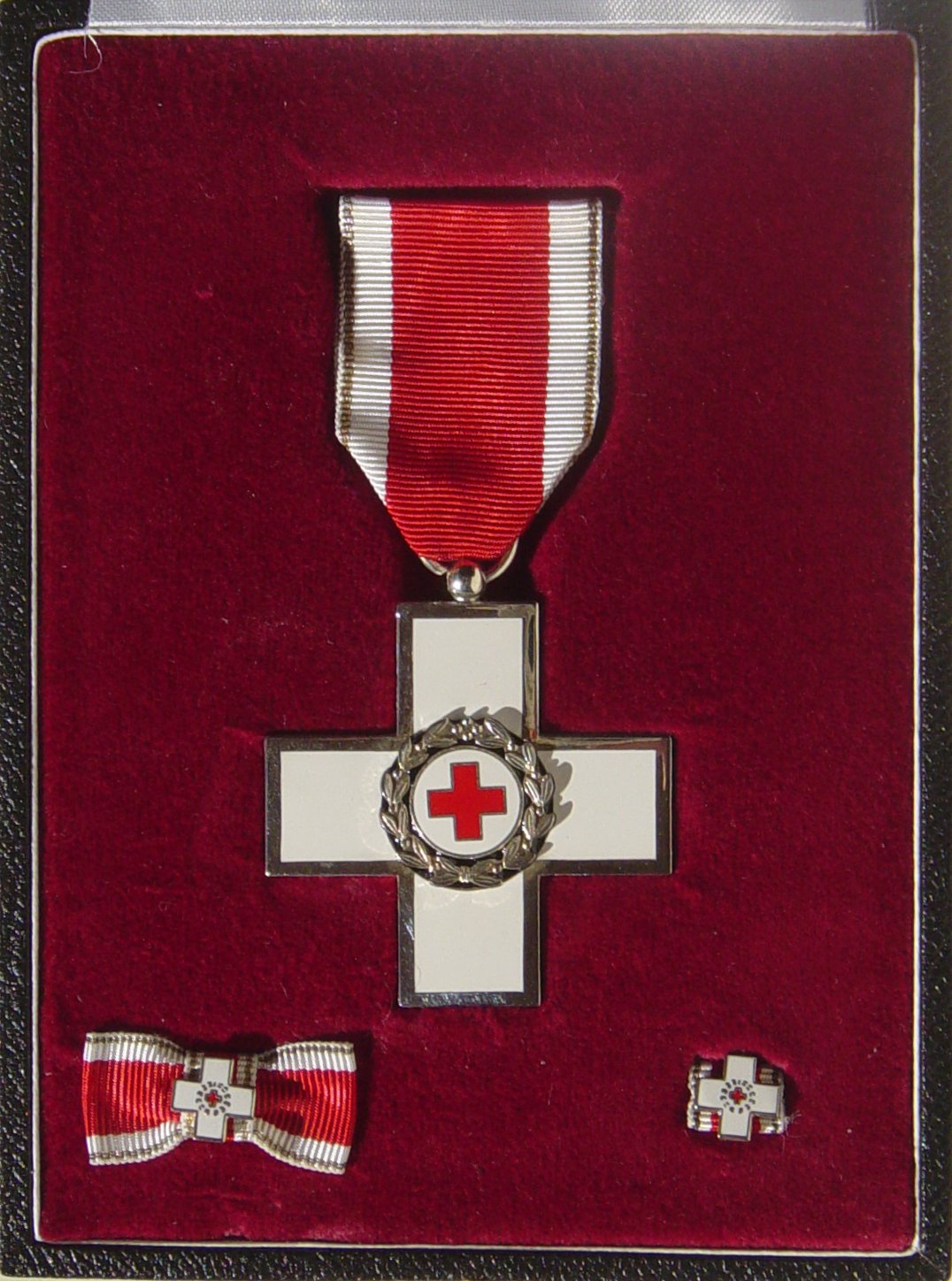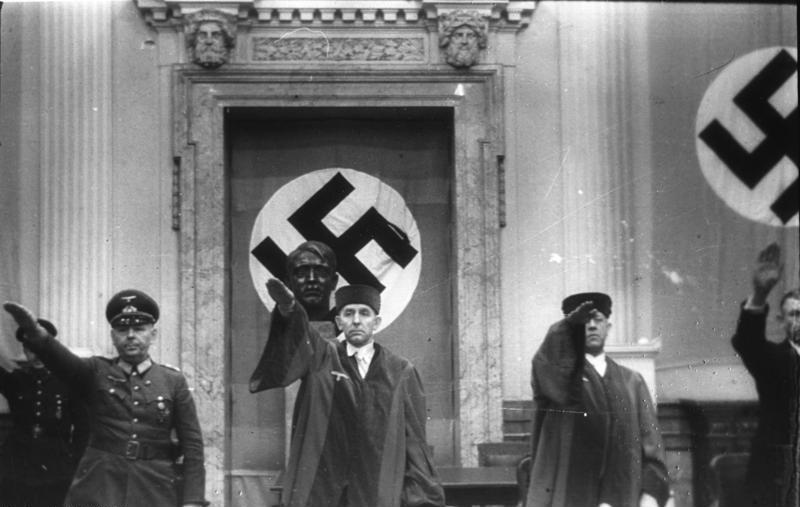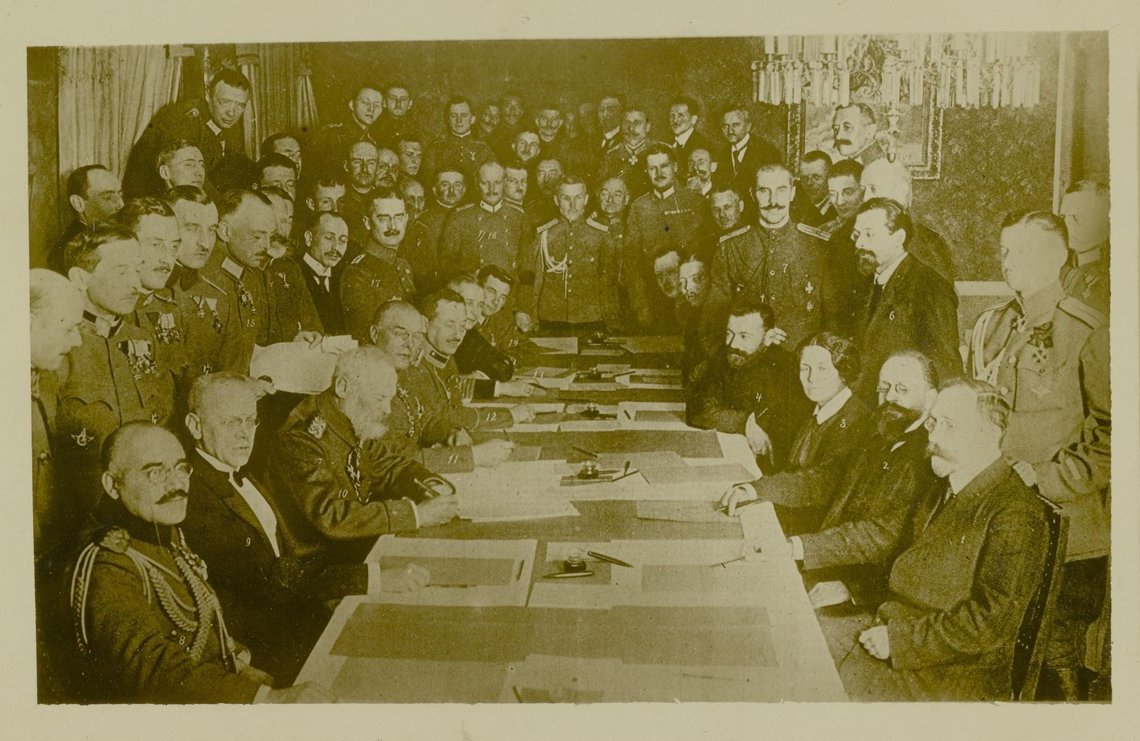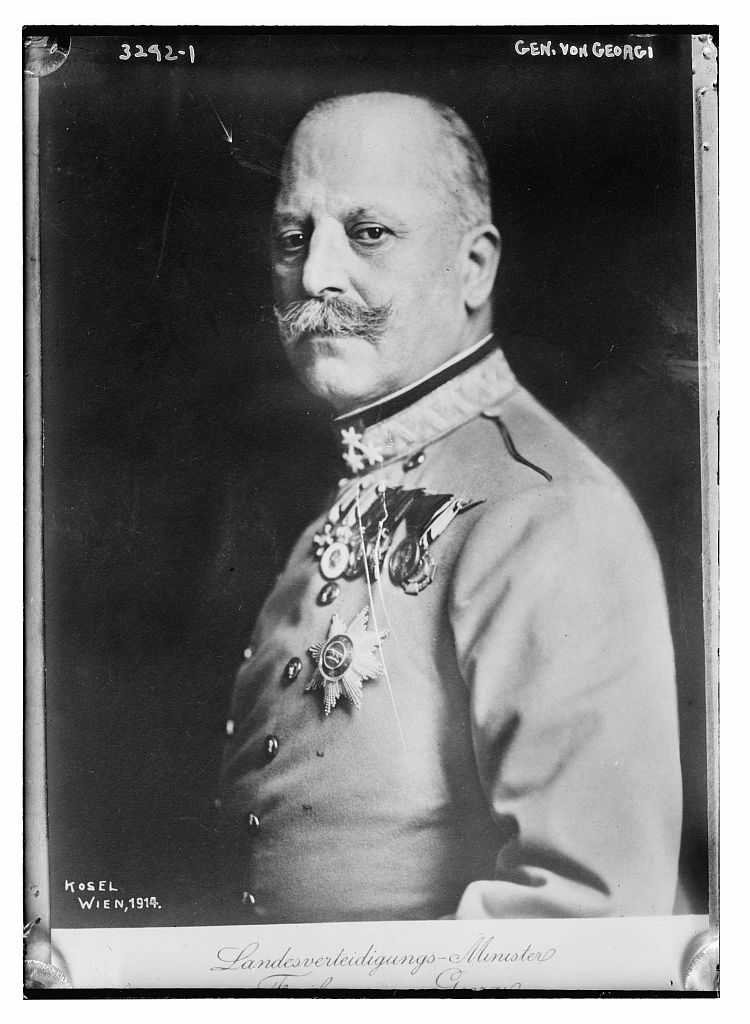|
Red Cross Medal (Prussia)
The Red Cross Medal was a German medal set up on 1 October 1898 by Wilhelm II. It had three classes and could be awarded to all those who carried out great service to the sick in peace or wartime, or for special achievement in the service of the German Red Cross. Though service to the sick during times of war had been recognized with prior awards of the Order of the Crown and General Honor Decorations with the Red Geneva Cross, Empress Augusta Victoria the royal patroness of the organization wanted an award to recognize work in peacetime as well. The Red Cross Medal was awarded in three classes, the Second and Third classes being worn as circular medals suspended from a red ribbon with white and black stripes. The First Class was a red enameled Geneva Cross with gilded Prussian Royal Crowns at the ends of the arms. This award was worn as a ''steckreuz'' on the breast, like the Iron Cross. Recipients could be promoted to the next class of the medal with five years time in se ... [...More Info...] [...Related Items...] OR: [Wikipedia] [Google] [Baidu] |
Prussia
Prussia, , Old Prussian: ''Prūsa'' or ''Prūsija'' was a German state on the southeast coast of the Baltic Sea. It formed the German Empire under Prussian rule when it united the German states in 1871. It was ''de facto'' dissolved by an emergency decree transferring powers of the Prussian government to German Chancellor Franz von Papen in 1932 and ''de jure'' by an Allied decree in 1947. For centuries, the House of Hohenzollern ruled Prussia, expanding its size with the Prussian Army. Prussia, with its capital at Königsberg and then, when it became the Kingdom of Prussia in 1701, Berlin, decisively shaped the history of Germany. In 1871, Prussian Minister-President Otto von Bismarck united most German principalities into the German Empire under his leadership, although this was considered to be a "Lesser Germany" because Austria and Switzerland were not included. In November 1918, the monarchies were abolished and the nobility lost its political power during the Ger ... [...More Info...] [...Related Items...] OR: [Wikipedia] [Google] [Baidu] |
German State Prussia Red Cross Award Medal Of 1898, Third Class In Bronze, Reverse
German(s) may refer to: * Germany (of or related to) **Germania (historical use) * Germans, citizens of Germany, people of German ancestry, or native speakers of the German language ** For citizens of Germany, see also German nationality law **Germanic peoples (Roman times) * German language **any of the Germanic languages * German cuisine, traditional foods of Germany People * German (given name) * German (surname) * Germán, a Spanish name Places * German (parish), Isle of Man * German, Albania, or Gërmej * German, Bulgaria * German, Iran * German, North Macedonia * German, New York, U.S. * Agios Germanos, Greece Other uses * German (mythology), a South Slavic mythological being * Germans (band), a Canadian rock band * "German" (song), a 2019 song by No Money Enterprise * ''The German'', a 2008 short film * "The Germans", an episode of ''Fawlty Towers'' * ''The German'', a nickname for Congolese rebel André Kisase Ngandu See also * Germanic (other) * Germa ... [...More Info...] [...Related Items...] OR: [Wikipedia] [Google] [Baidu] |
1898 Establishments In Germany
Events January–March * January 1 – New York City annexes land from surrounding counties, creating the City of Greater New York as the world's second largest. The city is geographically divided into five boroughs: Manhattan, Brooklyn, Queens, The Bronx and Staten Island. * January 13 – Novelist Émile Zola's open letter to the President of the French Republic on the Dreyfus affair, ''J'Accuse…!'', is published on the front page of the Paris daily newspaper ''L'Aurore'', accusing the government of wrongfully imprisoning Alfred Dreyfus and of antisemitism. * February 12 – The automobile belonging to Henry Lindfield of Brighton rolls out of control down a hill in Purley, London, England, and hits a tree; thus he becomes the world's first fatality from an automobile accident on a public highway. * February 15 – Spanish–American War: The USS ''Maine'' explodes and sinks in Havana Harbor, Cuba, for reasons never fully established, killing 266 me ... [...More Info...] [...Related Items...] OR: [Wikipedia] [Google] [Baidu] |
Blood Donation Badge Of Honor
The Blood Donation Badge of Honor (german: Blutspendeehrennadel) is a German award presented by the German Red Cross and by the Blood donation service of the Bundeswehr for voluntary unpaid blood donations. Description The badge depicts a golden cross with a red dot in the center, symbolizing a drop of blood on red background. The awards of 25 or more donations feature a laurel wreath around the cross. The awards of 50 or more donations also feature diamonds around the center. The number of donations is also shown at the bottom of the laurel wreath. If worn as a ribbon bar, a miniature version of the badge is attached to a red ribbon bar. Blood donation service of the German armed forces: For 3; 6; 10; 15; 25; 40; 50; 75; 100; 125; 150; 175; 200; 225; 250; 275 and 300 donations. Donors with three or ten blood donations receive their certificate of honor directly on site. Donors with 25 donations will receive their badge of honor on site and will be sent their certificate. In ... [...More Info...] [...Related Items...] OR: [Wikipedia] [Google] [Baidu] |
German Red Cross Decoration
The German Red Cross Decoration (german: Ehrenzeichen des Deutschen Roten Kreuzes) is a decoration founded in 1922, replaced by the Social Welfare Decoration in 1939 and re-founded in its present form on 8 May 1953. It is awarded by the German Red Cross. Badge of Honor of the German Red Cross Precursor After the end of the First World War, according to the provisions of the Weimar Constitution (Art. 109), medals and decorations were no longer allowed to be awarded by the state. At the German Red Cross, however, there was a particularly great need to thank mainly foreign Red Cross representatives for the reconstruction help after the World War by awarding decorations. After intensive consultations with government agencies, the parliamentary parties in the Reichstag and bolstered by reports, the German Red Cross decided at their general meeting in May 1922 to adopt a foundation deed. See also * Red Cross Medal (Prussia) * Blood Donation Badge of Honor References ... [...More Info...] [...Related Items...] OR: [Wikipedia] [Google] [Baidu] |
Jakob Weis
Jakob Weis (13 May 1879, Ommersheim, Saarpfalz – 18 March 1948, Zweibrücken) was a priest in the Diocese of Speyer, who also worked as a prison chaplain. During the First World War he became the army chaplain to the 12th Bavarian Infantry Division and Catholic pastoral care advisor to the Armee-Oberkommando Mackensen. From 1918 to 1920 he voluntarily joined soldiers in their internment so as to continue his pastoral care. Life Weis was ordained priest in Speyer Cathedral on 4 October 1901. He then spent time as a chaplain in Mittelbexbach (10 October 1901 – 30 August 1905), then time in Gersheim (31 August 1905 – 16 October 1905), then in Landau in der Pfalz (17 October 1905 – 30 June 1909). From 1 July 1909 to 27 February 1921 he served as chaplain to Zweibrücken prison, an extremely difficult and thankless pastoral post. From 4 August 1914 Weis was also pastor to a field hospital, then pastor to 12th Bavarian Infantry Division (known as "the Iron Division" for ... [...More Info...] [...Related Items...] OR: [Wikipedia] [Google] [Baidu] |
Hermann Reinecke
Karl Rudolf Ernst Auguste Hermann Reinecke (14 February 1888 – 10 October 1973) generally known as Hermann Reinecke was a German general and war criminal during the Nazi era. As head of the General Office of the Armed Forces in the OKW (Supreme Command of the Wehrmacht) during World War II, he was a major contributor to the prisoner-of-war policy that resulted in the deaths of approx. 3.3 million Soviet prisoners. Reinecke was tried, convicted and sentenced to life imprisonment at the High Command Trial. Military career Reinecke joined the German Imperial Army as a cadet in March 1905. He served throughout World War I during which he was awarded the Iron Cross first class and he was promoted to captain in 1916. He then continued his military service in the Reichswehr with the Army Office of Administration, an infantry regiment and the Reich Defence Ministry in Berlin. He served in the Wehrmacht, providing political training on behalf of the Nazi leadership. In January 1939, ... [...More Info...] [...Related Items...] OR: [Wikipedia] [Google] [Baidu] |
Prince Leopold Of Bavaria
Prince Leopold of Bavaria (Leopold Maximilian Joseph Maria Arnulf; 9 February 1846 – 28 September 1930) was born in Munich, the son of Prince Regent Luitpold of Bavaria (1821–1912) and his wife Archduchess Augusta of Austria (1825–1864). He was a Field Marshal (''Generalfeldmarschall'') who commanded German and Austro-Hungarian forces on the Eastern Front in World War I. Biography Military career Prince Leopold entered the Bavarian Army at the age of 15, and received his patent as a lieutenant dated 28 November 1861. He saw first combat during the Austro-Prussian War in 1866, where he commanded an artillery battery at Kissingen and Rossbrunn. In 1870, King Ludwig II of Bavaria sent Leopold to the battlefields of France, where the Bavarian Army was fighting alongside the Prussian Army in the Franco-Prussian War. He served with the 3rd Bavarian Artillery Regiment and saw action at Sedan and Beauvert. He was promoted to major in December 1870.Bavarian War Ministry, '' ... [...More Info...] [...Related Items...] OR: [Wikipedia] [Google] [Baidu] |
Friedrich Von Georgi
Friedrich Freiherr von Georgi (27 January 1852 – 1926) was a General of the Austro-Hungarian Army. Biography He was born in Prague,Georgi, Friedrich Freiherr von, Austrian Biographical Dictionary 1815-1950 (1957) Volume 1, published by the Austrian Academy of Sciences, Vienna. then part of Bohemia. The son of a military Colonel, von Georgi was born into a noble family which originally came from Saxony. He attended the Theresian Cadet Academy at Hainburg. After completing his education on 1 September 1871, he was commissioned as a Lieutenant in Feldjäger Bataillon No.6. In May 1877, von Georgi married Bertha Stamm. Together they had four children, though two of them died in infancy. From 1879 to 1881 he joined a military academy in Vienna. In 1882, von Georgi saw action in his first battle as a general staff officer of the 5th Gebirgsbrigade during a rebellion in Herzegovina. Following the campaign, he was awarded the Military Merit Medal in Bronze upon its introduction in ... [...More Info...] [...Related Items...] OR: [Wikipedia] [Google] [Baidu] |
Arnold Durig
Arnold Durig (12 November 1872 – 18 October 1961) was an Austrian physiologist remembered for his investigations involving physiological and pathophysiological aspects of individuals exposed to high altitude conditions. He very probably served as the model for the "impartial person" in Sigmund Freud's polemic booklet " The Question of Lay Analysis" (1926). Decorations and awards * 1906: Lieben Prize (Imperial Academy of Sciences, Vienna) * 1917: Member of the German Academy of Sciences Leopoldina * 1953: Corresponding member of the Bavarian Academy of Sciences and Humanities * Officer's Cross of the Order of Franz Joseph, with war decoration * Military Merit Medal (Austria-Hungary) * Decoration of Honour for Services to the Red Cross, 1st class * Red Cross Medal, 1st and 2nd class (Prussia) * Honorary citizen of the City of Vienna (1932) * Freeman of Tschagguns * In Montafon, streets are named after Arnold Durig: Hofrat-Durig-Weg in Schruns and Hofrat-Durig-Straße i ... [...More Info...] [...Related Items...] OR: [Wikipedia] [Google] [Baidu] |
Lorenz Böhler
Lorenz Böhler (15 January 1885 in Wolfurt, Austria – 20 January 1973 in Vienna) was an Austrian physician and surgeon. Böhler is most notable as one of the creators of modern accident surgery. He was the head of the AUVA-Hospital in Vienna, Brigittenau, that was later named after him: Lorenz-Böhler-Unfallkrankenhaus. This hospital was an international model during his time as the leading surgeon there. In radiology, the measurement of ''Böhler's angle'' on a foot X-ray can help detect fractures of the calcaneus. Early life At the early age of 5 Böhler – son of a family of craftspeople – knew he wanted to become a surgeon. When he was a little boy he used to anatomize small birds and squirrels. On 6 December 1896 an X-ray of a hand by Wilhelm Röntgen was published in ''Das interessante Blatt'' magazine. Lorenz Böhler saw it, cut it out and stuck it on his reading book. In 1896 he attended the fürsterzbischöfliche Knabenseminar in Brixen. After two years he left ... [...More Info...] [...Related Items...] OR: [Wikipedia] [Google] [Baidu] |







